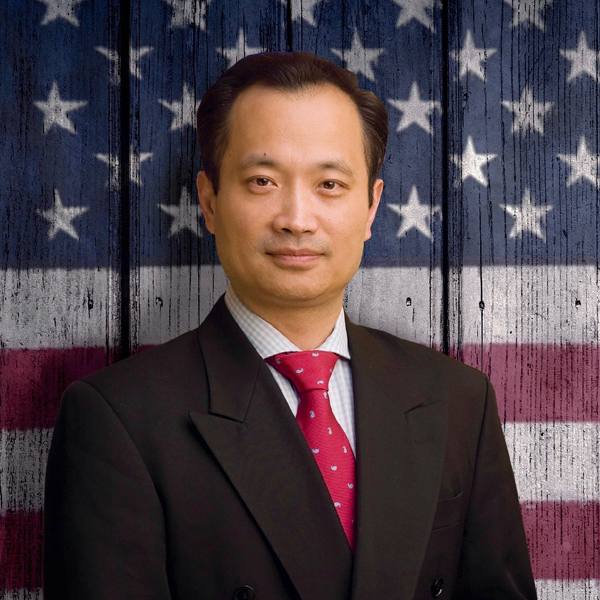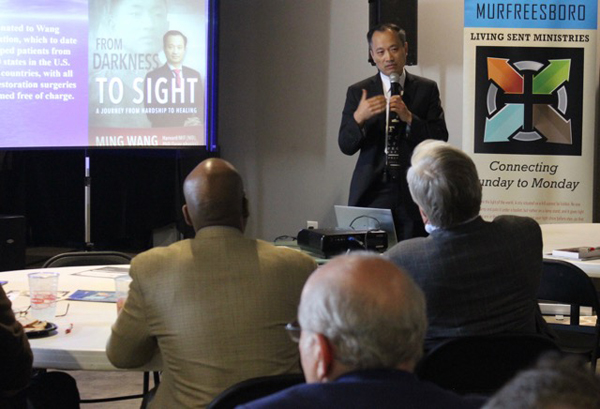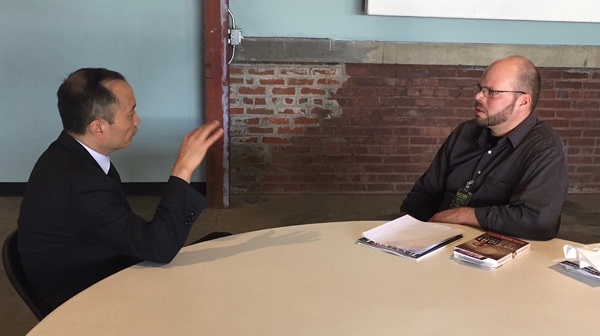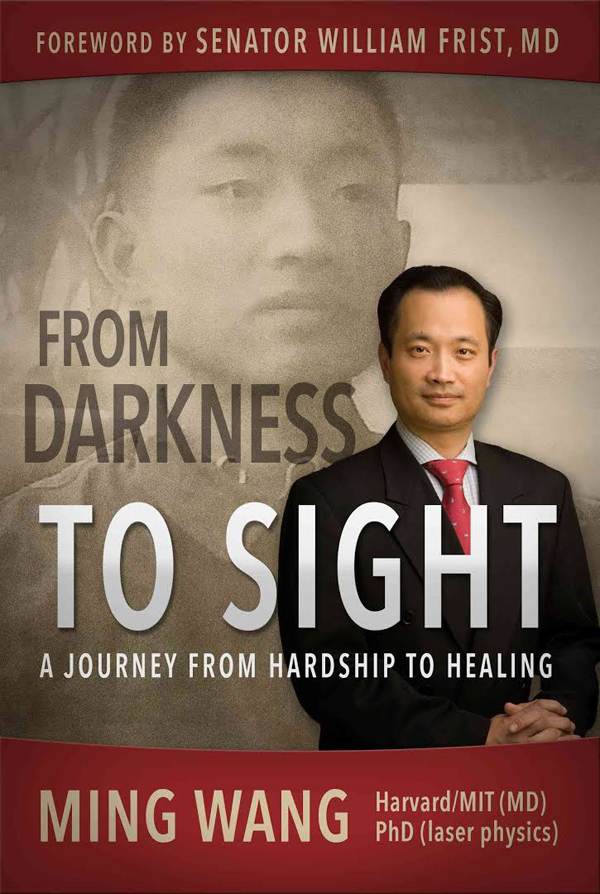
Ming Wang came to the U.S. “with only $50 and a English-Chinese dictionary in my pocket, but with a big American dream in my heart,” he says.
Today, the Nashville-based eye surgeon is one of the most renowned professionals in his field. Known all over the world, he frequently donates his time and skills so that he may help give sight to the blind.
Wang (born Wang Ming-Xu in Hangzhou, China) recounts his incredible journey at speaking engagements throughout Middle Tennessee and beyond, as well as in his 2015 book From Darkness to Sight.
He will visit Murfreesboro the morning of Thursday, Jan. 24, for a presentation to the Murfreesboro Breakfast Rotary Club.
Wang seeks every possible opportunity to encourage others and to spread the word on sight restoration as well as the Eye Ball fundraiser, his China Bible project and other charitable endeavors. Wang encourages other area organizations and churches to contact him for free talks and speaking engagements.
Wang has earned doctorate degrees from both Harvard and MIT, making him one of the few Lasik surgeons in the world who also holds a degree in laser physics in addition to his doctorate of medicine.
And while Wang is a dedicated student of science and technology, he still prays with many of his patients prior to undergoing surgery, asking for God to bless the medical procedure and guide the results.
“I ask their permission; when it’s your eye doctor with a laser, it’s hard to say ‘no,’” Wang joked.
“Faith and science can indeed work together,” Wang says. “Science is what things are. Faith is why things are. Science and technology give you the tools, but faith gives you the purpose.
“God ultimately has control, but I have 100 percent control of my effort.”
Wang’s experiences in China during the darkness, violence and suffering of its Cultural Revolution and “the worst famine in human history”—due to People’s Republic of China Chairman Mao Zedong’s insistence that the state take control of the grain—led him to want to help the underprivileged in other areas later in his career when he had the means to give back to others.
“I have come to understand that people who live in physical darkness have the most intense appreciation for sight,” he writes in his book. “Who appreciates sight the most? The blind. Who appreciates freedom the most? Those who don’t have freedom.”

Dr. Ming Wang serves as guest speaker at the Living Sent Ministries business luncheon in Murfreesboro.
Wang encourages Americans to not take their way of life for granted, and to “become a people who who truly appreciate something as precious in life as freedom, before we lose it.”
Wang also wants today’s generation in the United States to realize what Chinese youth went through not all that long ago, in a society where they were not so much concerned with acquiring the latest version of the iPhone but rather avoiding a lifetime of hard labor, starvation or the threat of their family members’ execution. He encourages the youth in all societies to value “their opportunity to get an education, to learn science, technology, history and about other people, to research God’s creation.”
Wang grew up during the brutal policies of Chairman Mao, the “dark period of the Chinese Cultural Revolution.”
“The first goal of the Cultural Revolution was to eliminate higher education,” Wang said. The establishment looked upon intellectualism, enlightenment and tradition with disdain, at least among the masses, and aimed to increase industrial output under a tightly regulated and controlled Communist system, partially through “re-education through hard labor.”
“Either we supported the ruling party or our lives would be at stake. Dissent was simply not tolerated, and dissidents were often executed,” Wang writes.
While these circumstances in society surrounded him, Wang says he still has fond memories of family life as a youth in China.
“We were materially poor, yet we were rich in love,” he says.
“During these years, China had no God and virtually no religion, besides the doctrine of communism,” Wang continues.
Both of his parents were medical doctors, as was his grandfather and numerous other family members. Wang said that growing up, his family “did not believe in God; we believed in education.”

Dr. Ming Wang talks with Pulse Publisher Bracken Mayo.
During the period when Wang was in high school “the government would send 100 percent of students to hard labor camps after they completed the 12th grade,” he says. “My parents made the agonizing decision to take me out of school, in a family where education is everything.”
In an effort to avoid a lifetime of hard labor, Wang’s parents halted his formal education, and he dedicated himself to learning dance and the erhu, a traditional Chinese stringed and bowed instrument, somewhat similar to a violin.
He would sit outside of the dormitory where his family lived and practice the instruments for hours, often in the cold, in snowy or windy conditions.
“Many youth were sentenced to a lifetime of hard labor. Music could be a way out of that. You might could get into a communist song and dance propaganda troupe,” Wang said.
Now, in Middle Tennessee, many have seen Wang ballroom dancing in television commercials to promote his practice and his fundraisers. He has performed the erhu alongside Dolly Parton and other notable musicians.
“This is not a hobby,” Wang clarifies regarding his dancing and instrumental abilities. “I learned these things to survive.”
However, ultimately, it was not his musical abilities that directed his path to America. Following Mao’s death in 1976, universities began to re-open. It was announced that, following a 10-year absence of a national college entrance exam, they would once again offer an opportunity for a college education for a very limited number of students, based on their performance on an entrance exam.
Although Wang missed out on two years of high school, his parents continued his education the best they could, both at home and by allowing Wang to illegally attend classes and labs at the medical university where they taught—until they were found out. Upon the announcement of the college entrance exam resuming, Wang’s parents lined up tutors for him, and he poured himself into studies, earning a spot at the University of Science and Technology of China, against minuscule odds.
Here, Wang was introduced to lasers: “focused beams of unified, monochromatic light . . . the science of lasers quickly became my passion,” he writes.
Eventually, through a student exchange program, Wang and some of his classmates traveled to America to study. He took full advantage of the opportunity, first landing a student-teaching position in chemistry at the University of Maryland, and later gaining admission to Harvard and MIT.
Now, established in the Nashville medical community, Dr. Wang has performed thousands of eye surgeries on his patients, including over 4,000 procedures on doctors.
“I’m known as a ‘doctor’s doctor,’” Wang said.
He was the inspiration for the character Martin in the recent feature film God’s Not Dead, and his autobiography has inspired and amazed many readers, in Tennessee and throughout the world.

“From Darkness to Sight chronicles Ming’s remarkable journey from the search for freedom as a teenager in China to building a new life in America, escaping deportation, fighting racial discrimination and financial hardships, and ultimately becoming a world-renowned eye surgeon and philanthropist. His is an inspirational story of moving from East to West, from atheism to faith, from fear, poverty and discrimination to healing—for himself and others,” Bill Frist wrote in the book’s introduction.
In his book, Wang writes that his father once told him “Ming, remember that life’s path is hardly ever a straight line. There are always lots of zigzags before you find your way. Never give up hope.”
The Murfreesboro Breakfast Rotary Club meets at Stones River Country Club at 7 a.m. on Thursdays. For more information, find Murfreesboro Breakfast Rotary Club on Facebook. Wang will speak on Jan. 24.
For more information on Dr. Ming Wang, visit drmingwang.com or wangvisioninstitute.com.












